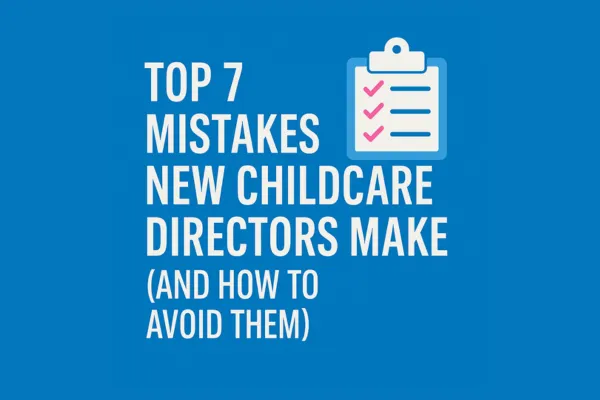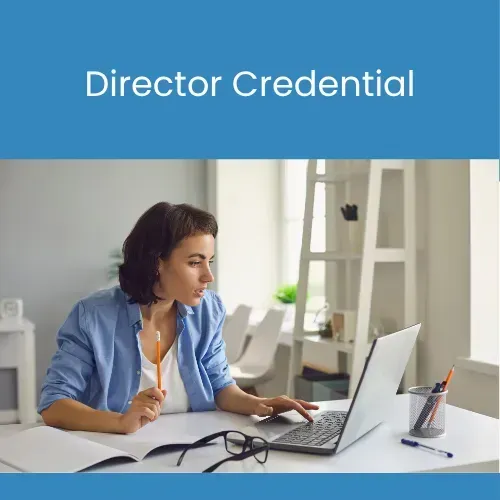Find Everything You Need.
See Our Latest Blogs
Stay up-to-date with our latest insights, tips, and trends by diving into our newest blogs. Whether you're seeking industry expertise, marketing strategies, or product inspiration, our blog section is your go-to resource for valuable content.

Top 7 Mistakes New Childcare Directors Make (and How to Avoid Them)
Stepping into the role of childcare director is exciting—and a little intimidating. Whether you’re an aspiring leader or just started your first director job, it’s easy to fall into a few common traps. Here are seven of the most frequent mistakes new directors make, along with tips to help you avoid them.
1. Trying to Do Everything Themselves
Story: When Jessica became a director, she wanted to prove she could handle it all. Within her first few weeks, she was answering phones, creating lesson plans, ordering supplies, and even covering in classrooms when teachers called out. Parents praised her dedication, but her days stretched to 12 hours, and she went home exhausted. Meanwhile, staff felt ignored—she never had time for them.
Directors who try to carry the whole load burn out quickly and unintentionally disempower their team.
How to avoid it: Delegate early. Trust your teachers to handle classrooms, empower admin staff with responsibilities, and keep your focus on leading the program as a whole.
2. Micromanaging Staff
Story: In another program, a new director named David thought being visible in classrooms would show parents and staff he cared. But instead of observing quietly, he corrected teachers mid-song, rearranged shelves while children played, and “fixed” bulletin boards without asking. Within a month, his team felt undermined and several teachers started job hunting.
Micromanagement stifles creativity and makes staff feel untrusted.
How to avoid it: Set clear expectations, then step back. Use staff meetings and check-ins to guide performance, not constant oversight.
3. Avoiding Difficult Conversations
Story: Maria noticed one of her assistants consistently arrived late—sometimes 10 minutes, sometimes 20. At first, she let it slide. She didn’t want to seem harsh as the “new boss.” But soon, other staff were frustrated because they had to open classrooms without help. Parents noticed the morning chaos, and morale dropped. By the time Maria finally addressed the issue, the damage was done.
Unaddressed issues don’t disappear—they grow. Avoiding tough conversations damages culture and fairness.
How to avoid it: Approach issues directly but kindly. Use clear examples, stay focused on solutions, and document conversations when necessary.
4. Ignoring Licensing Reports and Compliance
Story: A center welcomed a new director, but she never read through the previous inspection reports. During the next visit, the inspector cited them for the exact same issues: unlabeled cleaning supplies and incomplete staff files. Parents overheard the inspector’s comments, and rumors spread quickly about “unsafe conditions.” All because she hadn’t taken the time to review what was already on record.
Noncompliance risks fines, licensing trouble, increased insurance premiums, and your reputation.
How to avoid it: Review recent inspection reports immediately. Schedule routine internal checks, and create a system so compliance tasks don’t fall through the cracks.
5. Failing to Define Roles and Responsibilities
Story: In one center, responsibilities were never clearly assigned. The director assumed “everyone helps where needed,” but the result was chaos. One day, no one ordered snacks because each person thought someone else had done it. On another day, two staff members both scheduled tours for the same time slot, leaving a prospective family waiting awkwardly. Teachers also complained that classroom coverage was inconsistent because no one knew who was supposed to step in. Staff grew frustrated, and parents quickly noticed the disorganization.
Lack of clarity leads to dropped balls, duplication of effort, and frustrated staff.
How to avoid it: Write down roles and responsibilities. Even a simple chart ensures everyone knows what’s theirs to own.
6. Poor Communication With Parents
Story: After a playground accident, a child went home with a scraped knee. The teacher documented it, but the director never passed the information on to the parents. That night, another parent texted the child’s mom asking if her son was okay after the spill on the playground, news she hadn’t heard yet. The mother was furious that she hadn’t been told directly. A simple missed communication nearly cost the program two families.
Families need timely, transparent communication to feel confident in your care.
How to avoid it: Be proactive. Send weekly updates through your parent app, introduce yourself quickly, and reach out directly when issues arise.
7. Neglecting Enrollment and Marketing
A director at a once-thriving center assumed “families always find us.” She never updated the website, ignored emails for tours, and failed to track the conversion rate of inquiries to enrollments. Within six months, enrollment dropped by 20%. With fewer tuition dollars, staff hours were cut, morale suffered, and the spiral deepened.
Enrollment drives revenue. Without consistent marketing, even great programs struggle financially.
How to avoid it: Keep your website updated, respond quickly to inquiries, offer tours, and build community relationships that feed referrals. We highly recommend using a partner organization like ECE Mastery & Childcare Business Growth for assistance with enrollment and marketing if this isn’t your fortè.
Final Word
Every director makes mistakes—but you don’t have to repeat the most common ones. By focusing on delegation, communication, compliance, and enrollment, you’ll set yourself up for success from the very beginning.
👉 To avoid these and countless other mistakes, enroll in the Director Credential Program today.
Oklahoma Director ©2025 All Rights Reserved




